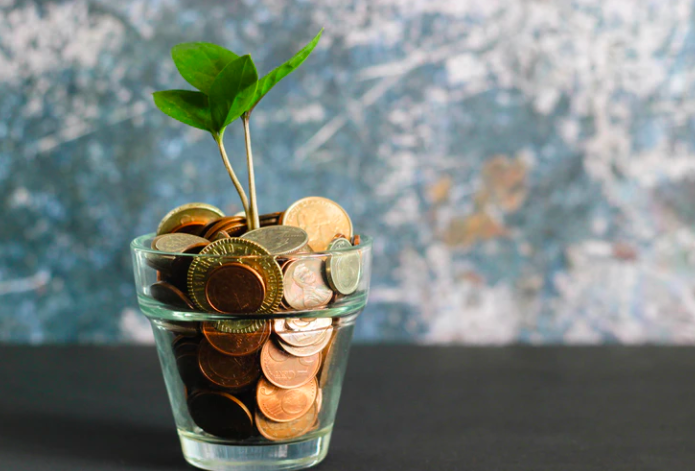Up until I fell ill in 2018, I never consciously cared for money.
Let’s put it this way: being financially independent has always been important to me, and I have been working since I was 21 or 22 years old. But my life goals were never about earning a big bonus or buying a mansion. In the sense, I wanted to make an impact in the world, amplify women’s voices, bring holistic wellness to anyone interested (because wellness should be a right, not a privilege), and just do good work. Money was a means to pay for the necessities and that’s about it.
But when the nurse in the ER in 2018 asked my husband how he wanted to pay my massive medical bill (I was semi-conscious, which she didn’t realize), something inside of me shifted. You can’t take care of others if you haven’t taken care of your own self—including your finances. When a crisis hits, hugs and wishes don’t pay the bills. Money isn’t a singular, secret ingredient that can make us happy or wholesome. But its prominence in sustenance and survival can’t be overlooked!
The next day in the hospital room, as I watched the sunrise, my thoughts awakened: I had a mindset around money that wasn’t empowering at all. Why was I uncomfortable with money? I grew up upper-middle-class and knew how hard my father had worked to give us the life we lived. What made me subconsciously choose paths that didn’t make me individually wealthy?
I am not sure whether the pain killed me more or the stress of my finances feeling out of control. Had we not been a dual-income family, how would I have paid my medical bills? According to The American Psychological Association (APA), six in 10 adults noted that money was a significant source of stress.
Was my relationship with money something I inherited from my ancestors or was it a reaction to an experience or some unresolved trauma? I don’t know. Depending on how you were raised, the culture you were brought up in, your family values, you might have different associations and attachments with money.
I didn’t see monetary transparency or get any financial education growing up. Most people I knew didn’t. My father worked as an engineer, we led a very comfortable life, and my brother and I were taught about the importance of savings and budgeting. My mother was a gifted homemaker. But my parents never shared the family’s “financial wellness” with my brother and me when we were growing up. There would be an underlying strain in family dynamics when money was less; there were exuberant celebrations when money became surplus. I started to observe that money situations could be a source of anxiety and stress.
I saw my extended family and my parents’ friends go over budget to keep up with social pretenses. Two glasses of whiskey later, you could hear the money rants from the men. I saw women scream, cry, and cuss. Adults spending what they didn’t own or could afford for external validation was disturbing.
I will say that most parents don’t understand how their own habits influence their children. When I reflect back, it seems like money was a taboo topic. I would hear in passing, “Money doesn’t grow on trees.” But when I tried asking questions around it, it made the elders feel uncomfortable. I didn’t know any adult who would hold space for kids to bring up any money-related dilemma. I also picked up on shame. Was wanting too much of it bad? Was not desiring money non-feminist of me? I heard scornfulness when I would express not wanting to be dependent on my future partner for money. Would making more money than the man create trouble in paradise? Did I want to be in an imbalanced relationship?
I have come to understand that managing money relationships can be complicated and nuanced for adults.
“Finance was never openly discussed in our house whilst I was growing up. Yet it always seeps through and there seems to be this ongoing trauma around money and finances that can be embedded into our lives without us realizing it,” says London-based Priya Shah, who is a wellness practitioner and a financial professional.
“My grandparents came from a generation that didn’t have much and so were conservative in their spending. Whilst I was always given everything I needed and more there was always this underlying feeling of shame when it came to money which I never really understood at the time. One of the biggest lessons I have learnt on my journey of wellness is on being honest—something that I struggled with beforehand because in certain situations it felt that the truth would diminish my worthiness.
When it comes to families, I believe that being honest about finance and having the freedom to discuss such matters without shame is key to our overall mental being. From a cultural point of view, women need more autonomy and support when it comes to finances. This is something that may only be available to those of us that have had an education and have been allowed a certain level of independence.”
Ramona Thomas, who is a financial advisor in New York City, reminds us that money is one of the top causes of stress in the United States, so the relationship between money and mental health is real:
“I am seeing so much of this play out in people’s financial decisions more during the pandemic. The relationship between money and mental health is positively correlated, meaning, when people feel more confident and secure about their money/financial matters, their thoughts toward money are more optimistic. Their outlook is positive, and their behaviors and financial decision making are more stable, responsible, and consistent.
Spouses and partners can start by talking with each other more about money, especially if this is a topic you typically avoid or approach with some trepidation. Listen actively and be mindful of your spouse/partner’s financial concerns. Ask questions and try not to judge them. Be willing to compromise and find common ground.
If you have children, agree on how to involve them in age-appropriate conversations about the family’s finances. This could include basic information about what it costs to keep your household running every month in terms of rent/mortgage, groceries, WIFI, streaming services, insurance, and utilities—how keeping the refrigerator door open affects the electricity bill.”
Every family handles financial literacy and planning differently. But one thing is universal: your financial well-being impacts your mental health and overall wellness. Feeling beaten down by money worries can adversely impact your sleep, self-esteem, relationships, productivity, and energy levels. For years, studies have shown that people in debt have higher rates of mental health issues like depression and anxiety than those who are debt-free.
It took me six months to get back on my feet after my illness in 2018. As much time as I spent rebuilding my body and business, I spent an equal amount of time reworking my mindset around money. I read books, worked with a mindset coach, and started to “see” myself differently. Part of the problem was that I was associated with industries—where if you dared to determine your services were worth something, people frowned upon you. “But you write and heal others. Why does money matter?” The most common passive-aggressive statement I would often hear.
It was a transformative experience—acknowledging my complicated relationship with money, setting concrete financial goals, not being caught in archaic gender norms, and asking for a fair raise/more money for the work that I did. Clearly, I was under-charging because none of my clients said, “No” or tried to low-ball me. At first, I felt guilty because I was used to giving away my time for free. Slowly, it felt so powerful to be paid my worth and to be able to support causes, local communities, and nonprofits with funds and not just my time.
A healthy relationship with money is integral to our overall well-being and to making the world a better place. Priya Shah reminds us: “Let’s take away the shame attached to conversations about money, we no longer need to pass this shame down the generations leading to more and more trauma.”
Ramona Thomas recommends: “People are more likely to be their authentic selves and to allow themselves to feel vulnerable talking about their personal finances when they feel comfortable with and confident in the person(s) they are talking to. This could be a relative, friend, peer, counselor, therapist, or a financial professional.”
Whatever stories you are telling yourself that are holding you back from reaching your full financial potential, reframe it. You deserve the best. Knowing you have enough money to nourish your family, support your kid’s education, save for your retirement, have cushion money for when things go awry, and some savings for the elderly in your family can be a calming feeling.
You can give back generously to those less fortunate than you while feeling less stressed about your future.
“If a person gets his attitude toward money straight, it will help straighten out almost every other area in his life.” ~ Billy Graham
~









Read 8 comments and reply